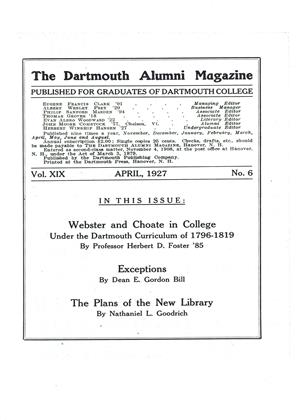The Medicine Man. Being the Memoirs of Fifty Years of Medical Progress by E. C. Dudley, M.D., LL.D. '73. J. H. Sears and Co., Inc. New York 1927.
In this autobiographical volume Dr. Dudley has done more than chronicle the events of a long and useful life. He has also told the thrilling story of medical and surgical progress in the last fifty years. And no one is better equipped to do this than one who was constantly in the ranks of the leaders of scientific progress.
To Dartmouth men the book holds especial interest in its vivid pictures of the college life of fifty years ago. The early struggles for an education with insufficient means and inadequate preparation, the long periods of absence from college while teaching and the eventual graduation with Phi Beta Kappa rank furnish ample material for self-congratulation even if Dr. Dudley does not allow himself to show it.
The method of admission as described by Dr. Dudley will be of interest when compared with present-day selective processes. Dr. Dudley had been examined for admission, after an intensive process of tutoring in Greek, Latin, Mathematics, English, and History. The Latin instructor conditioned him in the sixth book of Virgil remarking "It is a beautiful book. lam sure you will enjoy reading it this summer." President Smith then examined the credentials, fixed his eye on the applicant and said with great dignity: "Very good, very good indeed, Mr. Dudley, considering the time you have had. Ah! Ah! Here I observe the sixth book of Virgil. Mr. Dudley, Dartmouth College is less concerned over what a man has done than it is over what we think he will do. Now, my boy, go home. Sit down under the apple tree and don't you dare to open a book until you get back here next fall." The president then drew his pen through the words "Condition: sixth book of Virgil."
The prominent figures of old Dartmouth days pass vividly before the reader, Presidents Lord and Smith and Professors Sanborn, Noyes, Young and Quimby.
One episode of Dr. Dudley's senior year deserves special mention. Following in John Ledyard's trail he paddled from Hanover to Springfield, Massachusetts, shooting rapids and camping on the bank at night. Although he does not mention it, Dr. Dudley must have enjoyed the experience fifty-three years later when he was the guest of honor of the Ledyard Canoe Club at one of their island cabins in recognition of the pioneering trip which he made over the route annually followed by the Club on their trip to the sea.
The subsequent pages are no less engrossing in their recital of life at the Yale Medical School, the Long Island College Hospital and private practice and University teaching in Chicago. Many leaders in the medical profession came into close contact with Dr. Dudley during these years but none is of more interest to Dartmouth men than Dr. Edmund R. Peaslee '36 who filled many positions at Dartmouth and was also a professor in four other medical schools. Of him Dr. Dudley writes : "At times he gave courses in two or three colleges in the same year. Counting each annual course in each college as one year, it follows that the aggregate period of his teaching was not less than sixty-five years, so that since the span of his life was only sixty-four years he had taught one year longer than he had lived. In these various colleges at different times he filled every chair except that of chemistry. ' His medical and surgical writings covered an equally wide field. The only other man in the history of American medicine whose record would show equal versatility is Nathan Smith, the founder of Dartmouth, Yale and other medical schools."
An interesting interlude was the period (in 1922 and 1923) spent by Dr. Dudley lecturing at the medical school of Yale-in-China and at the Philippine General Hospital in Manila.
The frequent comment on the progress of medical science through the past half century is highly instructive as well as entertaining. Toward the end of the narrative we find the statement: "The last half century has witnessed more progress in the science of medicine than all previous time and this is only abeginning." The reader feels that the case has been well proved.
The book is enlivened throughout by a wealth of anecdote and humor and will prove of more than casual interest to the general reader or the student of medicine.
 View Full Issue
View Full Issue
More From This Issue
-
 Article
ArticleWEBSTER AND CHOATE IN COLLEGE
April 1927 By Herbert Darling Foster '85 -
 Lettter from the Editor
Lettter from the EditorEditorial Comment
April 1927 -
 Article
ArticlePRESIDENT HOPKINS SUGGESTS FOOTBALL MODIFICATIONS
April 1927 -
 Article
ArticleEXCEPTIONS
April 1927 By E. Gordon Bill -
 Class Notes
Class NotesClass of 1921
April 1927 By Herrick Brown -
 Sports
SportsDARTMOUTH QUINTET WINS FIRST LEAGUE CHAMPIONSHIP
April 1927
Eugene F. Clark
Books
-
 Books
BooksThe Graphic Arts in Belgium
November 1938 -
 Books
BooksFaculty Articles
April 1956 -
 Books
BooksMARKETING RESEARCH.
November 1952 By Albert W. Frey '20 -
 Books
BooksTOMORROWS CHURCH: CATHOLIC, EVANGELICAL, REFORMED.
MAY 1969 By CHARLES P. GILSON '21 -
 Books
BooksAN ADVENTURE IN TEXTBOOKS.
MARCH 1970 By DENNIS A. DINAN '61 -
 Books
BooksTHE GREAT CONSPIRACY,
March 1946 By Francis E. Merrill '26.





